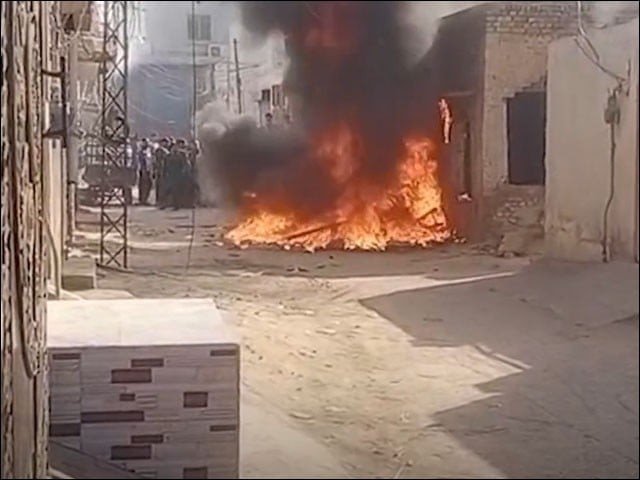On May 25, 2024, in Sargodha, Pakistan, a mob thrashed a Christian man who was suspected of blasphemy. Extremely devout Pakistanis responded angrily upon learning that the man had allegedly been charged with desecrating pages from the Holy Quran. Along with intentional fires to his home and shoe company, the man, along with his family and another, suffered excruciating torment. These incidents demonstrate how religious bigotry can endanger national security.
Death is one of the possible penalties under one of the strict blasphemy laws in the world which is of Pakistan. First imposed while India was a British colony, General Ziaul Haq expanded the scope of these regulations in the 1980s. These laws appear to have as their primary objective the protection of religious sentiments, yet they are occasionally employed to arbitrarily single out minority groups and exact revenge for personal grievances. The most recent incident in Sargodha demonstrates how religious sensitivity is rapidly developing in the nation and how a single charge of defamation without any proof necessary may incite a mob.
In case of such religious lynching, an atmosphere of dread and insecurity prevails among minorities. The social cohesiveness is undermined, which translates into compromised national security. The incident in Sargodha involving vigilante justice when police are present exposes the shortcomings of the local authority and heightens the anxiety among minority populations, which breeds societal disintegration.
Since 1987 till 2020, the Human Rights Commission of Pakistan (HRCP) has documented more than 1,500 instances of blasphemy, many of which resulted in lynching and mob violence. It is necessary to take quick actions to prevent such occurrences. Critical is the deterioration of public confidence in law enforcement. When the public believes that the law enforcement agencies are inefficient, they turn to vigilante justice. Law enforcement are either silent spactators or do not react quickly enough to stop it, which erodes public trust in the state's capacity to defend its citizens. For instance, in 2017 authorities came too late to stop the crowd from murdering Mashal Khan.
Major incidents such as the 2014 burning of a Christian couple in Kot Radha Kishan and the 2020 killing of a bank manager in Khushab highlight the trends of mob violence and emphasise the need of implementing significant reforms immediately to shield everyone from these types of crimes.
Lynchings carried out with religious justifications might also be a productive means of radicalising individuals and disseminating radical ideas. Extremist organisations attract people who are tired of the state not doing its job of enforcing justice and who wish to exploit these events to achieve their own agendas. These organisations present themselves as champions of religion while using religious rhetoric to promote bloodshed. The ability of this narrative to emote profoundly with marginalised or oppressed people may strengthen attempts at recruitment and radicalisation. To demonstrate the connection between conversion and mob violence, the Pakistan Institute for Peace Studies (PIPS) monitored the number of new members of extremist organisations following well-publicised lynchings.
Pakistan’s reputation suffers greatly from religious violence, such as the incident in Sargodha. Should nations that respect religious freedom and human rights penalise Pakistan politically or financially, it may become even more isolated. Such incidents are monitored by international human rights organisations, which also exert pressure on the Pakistani government to implement reforms. Pakistan has complex foreign policy aims, which strains its ties with other nations, particularly western ones. Pakistan was flagged as a nation to be highly concerned about in a significant 2019 US Commission on International Religious Freedom (USCIRF) assessment due to its blasphemy laws and regular mob violence.
We need a comprehensive solution in order to address the strategic security issues that religious lynchings generate. Blasphemy laws must be changed to prevent their excessive abuse. This will necessitate a positive reinterpretation of the term "blasphemy," tighter proof-requiring standards, and harsher penalties for false accusations. The goal of legislative reforms should be to ensure that those accused of blasphemy receive fair trials and are shielded from mob violence. More resources and instructions are needed by law enforcement to effectively address delicate religious issues. These include fast reaction teams and specialised training for police personnel in cases of blasphemy accusations. Law enforcement must take internal accountability if the public is to trust them once more.
Sargodha saw a horrific incident that demonstrates the perilous combination of religious hate and vigilante punishment. Strategically significant issues evolve with the incident with regard to Pakistan's social order, national security, and international relations. We must examine these problems from every perspective if we are to adequately address them. Among these include modifying the legislation, strengthening law enforcement, involving the community, and collaborating with other nations. The primary reasons of religious violence must be effectively addressed if Pakistan is to realise its objectives of building a safer and more cohesive society where the law is upheld, and individuals are safe from mob violence.


COMMENTS
Comments are moderated and generally will be posted if they are on-topic and not abusive.
For more information, please see our Comments FAQ